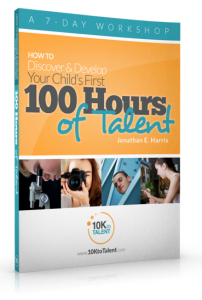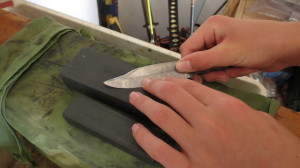
Here in a pretty little 17th century wedding rhyme, I give to you a simple strategy for talent building:
Something Old
Something New
Something Borrowed
Something Blue

Here in a pretty little 17th century wedding rhyme, I give to you a simple strategy for talent building:
Something Old
Something New
Something Borrowed
Something Blue

There is a great opportunity for children on the Internet to create nicknames to reflect their talent focus. This gives them some status and allows others to easily find them online in the context of their talent. Instead of creating a user name like “BigJohn” or “John1235” which sounds like a child who still needs to find a focus, how about creating a user name that helps your child fit into the little online communities of people who have his same talent focus? Try instead “SwordQuencher” for a young knife maker who knows that you have to quench blades to harden them properly. Try for example “ScarabCoder” for a young programmer who learns by re-using small bits of code from other more experienced programmers – just like the scarab insect re-uses discards for his own purpose.

Do you have a goal for how often you want your child to practice writing about his talent? It’s not good if your child is currently writing ten little essays or articles on any number of random topics for every one article on his chosen long-term talent. Instead of writing about such things as his latest vacation or a description of his team’s last winning baseball game, what if every one of those essays were replaced by an article describing an activity or principle of his talent? You can continue having your child practice all sorts of writing methods to satisfy outside requirements, but you can apply those methods in the context of your child’s talent. If you re-orient his writing focus, now how many essays do you think he could write up on his talent in one year’s time?

Part of the power of putting in 10,000 hours of deliberate focus on a talent is that it makes it very hard for those who adopt a talent late in life (such as right after college) to come anywhere close to out-performing those who develop their talent early in their childhood. Consider for example that if a child writes about some aspect of his talent, say WWII history, three times a week from age 10 to age 20, that he would have put in over 2,000 writings well before the average college student has even started on a major that has a similar historical focus. If your child majors in history with a WWII focus, he has already out-thought all the others on that same subject by a 2,000 fold factor! Where others don’t even know they could eventually have a unique voice, your child would come across as amazingly confident, dripping with conceptual and tactical details, and supremely at ease in his already well-developed voice. At that point in time, of all the student portfolios, who do you think a college professor or a prospective employer would rather have a second interview with?

Ecclesiastes hits head on the philosophy of despair and the dark brooding that comes from believing that your plans and actions make no difference in the long-run. Solomon, after spinning that dark philosophy every which way, says that, no, when you do make plans, make plans for action, and then rest confidently without guilt in those pleasures that God allows for you today. Full future details are hidden from you, Solomon says, but what you do for good does matter and it is an inheritance to your children. So make homeschooling plans that don’t expect for a lowest acceptable outcome, but make plans based on a belief that God promises to prosper righteous efforts – because He wants to and has rigged the universe for that purpose. For a great “pump-me up” to fight against any feeling of encroaching darkness, read Gary North’s excellent commentary and explanation of the book of Ecclesiastes (it’s actually part of a larger series on the books of the Bible from a uniquely Economic/Business angle).

Around the age of twelve (12) is when you will often see boys get really antsy about the purpose and meaning of the schoolwork they are doing. At that age their ability to think and plan seems to increase significantly and that is when as a parent you are pushed to also make new educational plans. Keep coasting by picking standard curriculum from a general educational menu and you will meet resistance and sullenness. Start picking specific courses and learning modules that encourage a talent focus and watch your child’s mind roar forward with intellectual energy. No talent yet? Try the 7-day-workshop for discovering and developing your child’s first 100 hours of talent.
What to do with already bought curriculum? Make it serve the talent your child is building in his life (or better yet, start a blog). Here’s an example of what this means in the context of a popular homeschooling resource published by Excellence in Writing. When you look at the table of contents, it lists the essays and articles it uses in order to demonstrate the course’s writing techniques and asks your student to use the same content for practice – it does not care what the content is about, only that you have something to demonstrate its method. If your child has a music focused talent, only one in all that entire list of articles pertains to music, with a largely useless one from the perspective of a talented musician, about Thomas Jefferson playing the violin to relax. This course represents about 300 hours of solid work with only 20 hours related to music. Instead of losing 300 hours, your child can gain an extra 300 hours of talent building by substituting each article in that curriculum with a serious one related to music.

Are you worried that your child does not care about what he is writing? You should be, because not caring means he is not learning how to develop a specific voice that others will want to listen to and it means he is not learning to write something useful even in the face of incomplete knowledge. Typical ‘non-caring’ writing will produce high-school research papers that no one but the teacher will read: papers that are lifeless, mechanical, and based on topics that were chosen because they were easy to find in the school library for citation proof. Though there is a place for the mechanics of writing, you should not allow it to be more important than writing for a purpose. As parent of a child developing his talent, you do have a ready solution to the caring problem: insist that your child always connects his essays to an aspect of his talent.

Another example of using talent development in your children to also promote friendship and bonding between your children, happened this past week between two of my sons. One son who has been developing an on-going focus on stones and metals has been following an online recorded course from 17th generation Yoshimoto bladesmith Murray Carter (long live the power of the Internet!) on the topic of how to properly sharpen knives. The other, younger son, has been developing his baking and kitchen prepping skills on a consistent basis and therefore uses knives regularly. Voila: the talents have intersected! After practicing on cheaper blades, we finally got our big expensive kitchen knives properly sharpened by our son Caleb (13) who was proud to have my son Gideon (9) be able to now use them without the previous dangerous slipping that came from dull knives. The respect they have for each other’s abilities keeps growing because the impact of what they are doing is useful and real on even a young person’s level.

There is also room for practicing the art of stealth, or social prudence, in your child’s talent development. By stealth, I mean avoid putting on display your child’s awkward and early attempts at mastering his talent and do not invite the admiration of friends and relatives. Many well-meaning friends and relatives have the popular, but false view, that any talent worth pursuing must spring full-blown out of your child’s first training of his art or science and, if it doesn’t, you should not pursue it all. This negativity could potentially discourage your child (and you) at too early a stage when you are still mapping out the big talent plan for your child’s life. So word to the wise: until the time is ripe, practice the art of stealth.